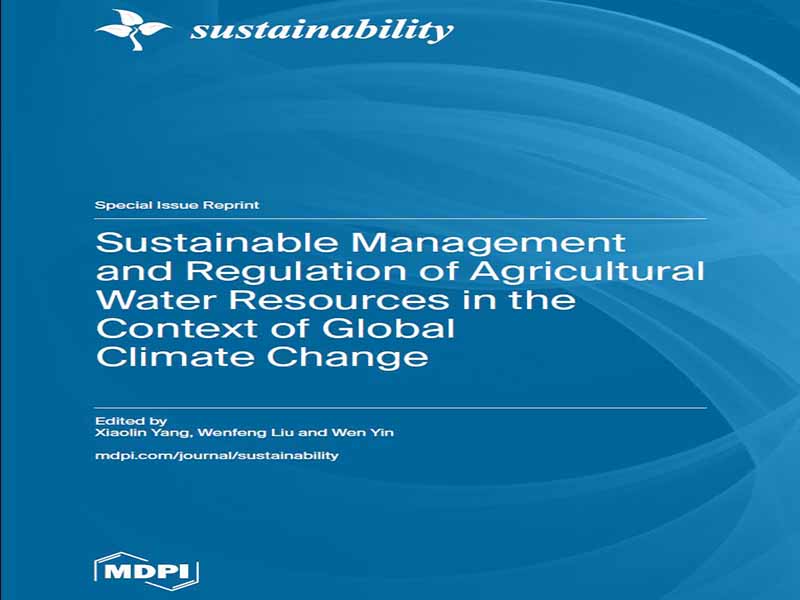- عنوان کتاب: Sustainable Management and Regulation of Agricultural Water Resources in the Context of Global Climate Change
- نویسنده: Xiaolin Yang, Wenfeng Liu, Wen Yin
- حوزه: کشاورزی پایدار
- سال انتشار: 2025
- تعداد صفحه: 212
- زبان اصلی: انگلیسی
- نوع فایل: pdf
- حجم فایل: 6.76 مگابایت
آب، شریان حیاتی کشاورزی است، بخشی که امنیت غذایی و معیشت جهانی را حفظ میکند. با این حال، پیچیدگی فزاینده مدیریت آب در کشاورزی، که با تغییرات اقلیمی جهانی تشدید شده است، چالشهای مهمی را برای پایداری این منبع حیاتی ایجاد میکند. به طور خاص، تغییرات اقلیمی خطرات مرتبط با مدیریت آب کشاورزی را تشدید کرده است، به ویژه در مناطقی که از قبل با کمبود آب دست و پنجه نرم میکنند [1]. اگرچه برخی از جنبههای تغییرات اقلیمی، مانند افزایش بارندگی و غلظت بالای CO2، ممکن است مزایای محلی داشته باشند، اما تأثیرات کلی آن – کاهش دسترسی به آب، افزایش دفعات وقوع رویدادهای شدید آب و هوایی و تغییر الگوهای بارندگی – بهرهوری کشاورزی و امنیت آب را تهدید میکند. علاوه بر این، با افزایش جمعیت جهان، تقاضا برای غذا و آب در حال افزایش است و فشار بیشتری بر منابع آبی که از قبل محدود بودهاند، وارد میکند [2]. علاوه بر این، تغییرات اقلیمی با تغییر الگوهای بارش، افزایش فراوانی و شدت رویدادهای شدید آب و هوایی و افزایش دما، این فشارها را تشدید میکند که همه این موارد بر مصرف آب کشاورزی تأثیر میگذارند [3]. در نتیجه، در مناطقی که کمبود آب از قبل نگرانکننده است، این تغییرات چالشهای اقتصادی و اجتماعی قابل توجهی را ایجاد میکنند. علیرغم برخی مزایای محلی، تأثیر کلی تغییرات اقلیمی بر مدیریت آب کشاورزی به شدت منفی است و این امر مستلزم تدوین استراتژیهای سازگاری قوی است [4]. در این زمینه، تدوین استراتژیهای سازگاری از طریق مدیریت و تنظیم پایدار آب نه تنها یک ضرورت، بلکه یک امر ضروری است. بنابراین، این شماره ویژه در پی ارتقای درک ما از خطرات و راهبردهای سازگاری در مدیریت آب کشاورزی است، با هدف افزایش استفاده کارآمد از منابع محدود آب و تضمین امنیت غذایی در اقلیم در حال تغییر. برای دستیابی به این هدف، این شماره ویژه با بررسی روندهای تاریخی و آینده در تبخیر و تعرق محصولات و نیازهای آبیاری، ارزیابی اثربخشی اقدامات مختلف زراعی و سیاستی و ارائه مسیرهای پایدار برای سازگاری با تغییرات اقلیمی آینده، قصد دارد به این چالشها بپردازد. در نهایت، هدف این است که درک ما از خطرات و فرصتهای مرتبط با مدیریت آب کشاورزی در شرایط تغییرات اقلیمی افزایش یابد و دانش لازم برای تدوین استراتژیهای مؤثر برای کاهش آسیبپذیری بخش کشاورزی و افزایش تابآوری آن در اختیار سیاستگذاران قرار گیرد. در نتیجه، میتوانیم برای اثرات تغییرات اقلیمی بهتر آماده شویم و از دسترسی مداوم به منابع آب برای تولیدات کشاورزی اطمینان حاصل کنیم و از این طریق امنیت غذایی و معیشت جهانی را حفظ کنیم.
Water is the lifeblood of agriculture, a sector that sustains global food security and livelihoods. However, the increasing complexity of water management in agriculture, exacerbated by global climate change, poses significant challenges to the sustainability of this vital resource. Specifically, climate change has intensified the risks associated with agricultural water management, particularly in regions already grappling with water scarcity [1]. While certain aspects of climate change, such as increased precipitation and elevated CO2 concentrations, may offer localized benefits, the overarching impacts—reduced water availability, more frequent extreme weather events, and shifting precipitation patterns—threaten agricultural productivity and water security. Moreover, as the global population continues to grow, the demand for food and water is increasing, placing additional pressure on already strained water resources [2]. In addition, climate change exacerbates these pressures by altering precipitation patterns, increasing the frequency and severity of extreme weather events, and raising temperatures, all of which impact agricultural water use [3]. Consequently, in regions where water scarcity is already a concern, these changes pose significant economic and social challenges. Despite some localized benefits, the overall impact of climate change on agricultural water management is overwhelmingly negative, necessitating the development of robust adaptation strategies [4]. In this context, developing adaptation strategies through sustainable water management and regulation is not just a necessity but an imperative. Therefore, this Special Issue seeks to advance our understanding of the risks and adaptation strategies in agricultural water management, with the goal of enhancing the efficient use of limited water resources and ensuring food security in a changing climate. To achieve this, this Special Issue aims to address these challenges by exploring historical and future trends in crop evapotranspiration and irrigation requirements, evaluating the effectiveness of various agronomic and policy measures, and proposing sustainable pathways for adapting to future climate change. Ultimately, the goal is to enhance our understanding of the risks and opportunities associated with agricultural water management under climate change and to provide policymakers with the knowledge needed to formulate effective strategies for reducing the vulnerability of the agricultural sector and increasing its resilience. As a result, we can better prepare for the impacts of climate change and ensure the continued availability of water resources for agricultural production, thereby safeguarding global food security and livelihoods.
این کتاب را میتوانید از لینک زیر بصورت رایگان دانلود کنید:




































نظرات کاربران